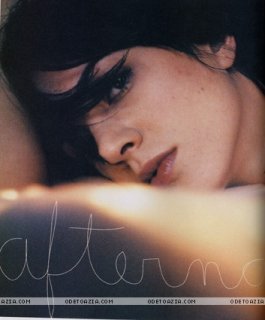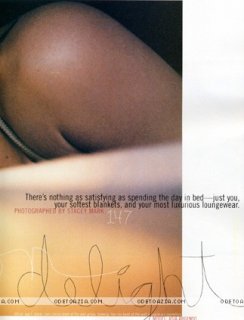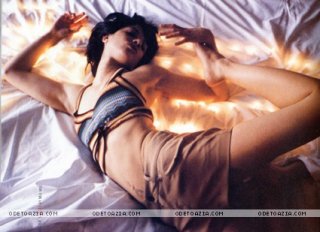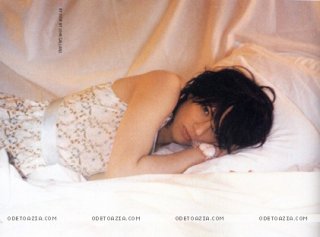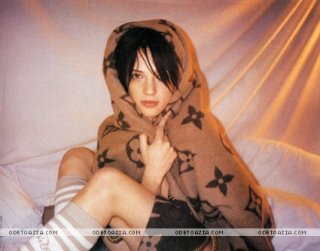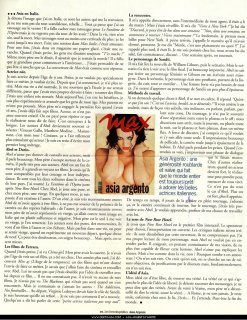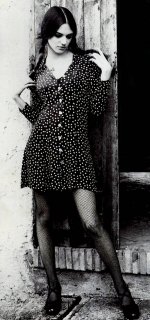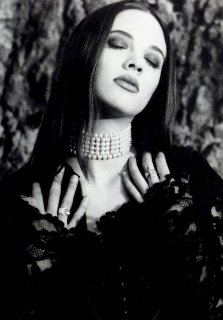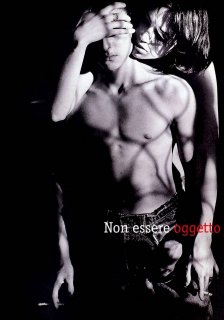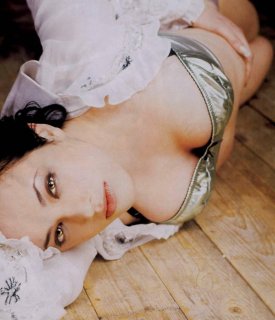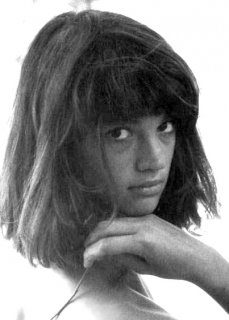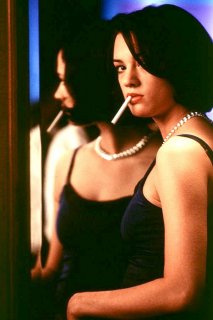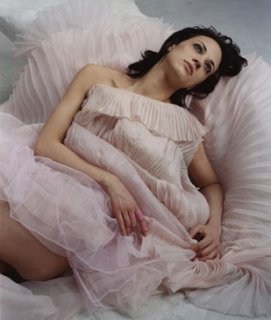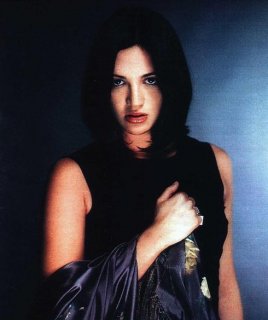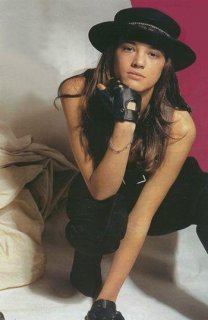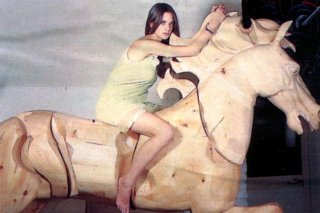You are using an out of date browser. It may not display this or other websites correctly.
You should upgrade or use an alternative browser.
You should upgrade or use an alternative browser.
Asia Argento
- Thread starter james
- Start date
crow_watcher
Active Member
- Joined
- Feb 21, 2006
- Messages
- 4,474
- Reaction score
- 2
She was so hot in xXx.
La bordélique
earthbound
- Joined
- Mar 2, 2006
- Messages
- 4,703
- Reaction score
- 8
^ That is one of my fave editorials from Nylon ever.
indexmagazine.com
Interview by BRUCE LABRUCE, 2001





When Asia Argento walks down the street in Milan, activity grinds to a halt. All heads turn, and clamoring autograph-seekers trail in her wake. In her stiletto heels, dark glasses, and sheer red wrap, Asia is every inch the glamorous movie star, right down to the shivering Chihuahua at the end of a long leash. Never mind that she’s eight-and-a-half months pregnant. Asia is Italian film royalty. She first appeared on the silver screen when she was only nine years old, playing a small part in an experimental film by Sergio Citti. By the age of sixteen, she had shocked all of Italy — and garnered a good deal of attention at Cannes — with her portrayal of a young girl in an incestuous relationship in Michele Placido’s le Amiche del Cuore. That same year, Asia was cast for the first time by her father, the legendary horror auteur, Dario Argento, in a particularly macabre film called Trauma. Her performance was scandalously erotic. Last year, Asia let her own directorial debut loose upon the world. Comical and autobiographical, Scarlet Diva is an exuberant challenge to the p*rn genre, written and headlined by Argento herself. This summer index’s own staff pornographer, the irrepressible Bruce LaBruce, caught up with the controversial starlet in Milan, just days before Asia’s daughter, Anna, was due to be born.
BRUCE: So how exactly is your family perceived in Italy?
ASIA: People are very suspicious of us. They wonder what sort of life we lead, what kind of monsters we are — as if we were the Addams family. But to be honest, we don’t even think about it. I mean, my father writes scripts for me where I have to do all these radical things, but what can I say? I’m very happy to work with him. I’m a big fan. Maybe I don’t understand why he has to r*pe me. But my mother had to deal with similar issues — my father always killed her.
BRUCE: I didn’t know she’d acted in his movies too.
ASIA: She was in lots of them. For instance, she was the lead in Deep Red. She wrote Suspiria, which is basically the story of her grandmother, my great-grandmother.
BRUCE: So where do you think your father’s obsession with killing women in his movies comes from?
ASIA: His mother, of course. It’s a theme that comes back again and again — the mother as killer, the mother as monster. But I think his own explanation is the simplest and nicest — he kills women because they’re more beautiful to kill. They scream better, they move better, and they understand pain better.
BRUCE: It’s just an aesthetic.
ASIA: For him it’s an aesthetic. For me there are other dimensions. For example, it’s very hard for me to shoot a nude scene with my father, because in reality we don’t have a very intimate relationship — you know, I don’t tell him personal stuff. He’s a mellow, easy person, but he’s still my father.
BRUCE: Don’t you ever enjoy the more transgressive scenes?
ASIA: They can certainly be freeing. In The Phantom Of The Opera, I lose my virginity in front of my father. It’s the Electra complex to the maximum! Although there is also a bit of the Oedipal, because my father was a mother figure to me in many ways, perhaps even more than a father figure.
BRUCE: Do you think of yourself as having a strong masculine side?
ASIA: Yes, much, much stronger than the feminine.
BRUCE: I think that comes out in your own movie, Scarlet Diva. The sexuality is so aggressive in that film. Your character is almost a hard-****ing man in reverse.
ASIA: Well, I think all the characters in Scarlet Diva are me. I’m the nasty producer. I’m the junkie. And everything that you see is based on things that actually happened in my own life — although I had to make the details more grotesque and funny in order for them to work on film.
BRUCE: That must have been cathartic.
ASIA: It was a true exorcism. I was able to laugh about those things and then forget them. Although I have to admit that while I was writing Scarlet Diva, I suffered from agoraphobia. I was stuck in my apartment for months.
BRUCE: Where did that came from?
ASIA: I think I was worried about people’s expectations of me. And also, I was very lonely. I’ve always been quite solitary.
BRUCE: You were worried about living up to your image?
ASIA: Or living down to it. [laughs] I was also coming to terms with the fact that I never really wanted to be an actress.
BRUCE: But you’ve been acting since you were nine years old!
ASIA: Only because it was an easy way to get my parents’ attention. My father didn’t believe I could act until I was sixteen, when I did a film called Le Amiche del cuore, which got great reviews at Cannes. It was about incest — I played the girl who was molested. After that, my father finally cast me. Never before that.
BRUCE: Wow. And even with that early success at Cannes, you never felt connected to acting?
ASIA: Well, it’s hard to find people to work with, not for. I mean, it’s okay to be an instrument, but it’s more important to be in good hands. It’s similar to being a geisha — I like to make the director happy, but I want to feel some passion in return. I want to work with someone who can actually teach me something. You see, acting is generally just two months of your life — you go, you do your job, but nothing changes inside you once the job is finished. You go on to another film. But when you’re directing, a project might take several years of your life. The film is your obsession, and nobody cares about it but you. It’s like having a baby stuck inside you. At a certain point, you can’t hold it back.
BRUCE: Now that you’ve made Scarlet Diva, will you go back to acting?
ASIA: Sure, but I don’t care about being in big films. I’d rather work two days on a TV show and live on the money for a year.
BRUCE: Going back to the agoraphobia, do you think your loneliness had to do with the fact that you were in a bad relationship at the time? I don’t want to name names, but I think you were seeing a married American rock star.
ASIA: I was in a very mixed up reality — feeling like another kind of geisha. On the one hand, I would lock myself in my apartment wearing nothing but pajamas all day. And on the other, I would fly to Japan to be with him, and I would dress like an archetypal woman, with the high heels and everything. I guess I sought that out because I wasn’t able to experience real, lasting love yet. The thought of someone coming into my place and leaving their things was a nightmare to me. The idea of being obliged to talk to somebody — of having that level of intimacy — disgusted me.
BRUCE: Well, now you seem to be in a great relationship.
ASIA: Yes, the only person I want to spend time with is my boyfriend, Marco. He’s very peaceful and calm. He plays the piano, and I read, and he’s never intrusive. He’s a great person. It’s a miracle to me, because I’ve never even had friends that I would want to hang around with for longer than twenty-four hours.
BRUCE: What about your little dog, Dziga?
ASIA: Well, I think he taught me how to open up. Before him, I never took care of anybody but myself. This little rat needs me to eat, to pee — he needs me for everything. Taking him on was really important. I got him right after I finished Scarlet Diva.
BRUCE: So I have to ask you about the accident …
ASIA: Oh my god. This is what happened. I was directing a video for my boyfriend. It was about drinking absinthe, so I had a real bottle in my car — which I never tried because I was already pregnant. So we were driving to the shoot at six in the morning, in the fast lane on the highway. All of a sudden, this sleepy ******* put on his turn signal and changed lanes without looking. He hit me from the right, and my car started to go out of control.
BRUCE: This was on a freeway?
ASIA: On a freeway, with cars driving a million miles an hour, and I was six months pregnant! So I regained control of the car, but it was foggy and I couldn’t see what had happened to the other guy. Then I heard a crash — it was really scary. And I couldn’t go back because I was on the freeway. I was in shock — I started to panic — and I decided to go to the doctor and call the police, which I did. Meanwhile, the other guy went straight to the newspapers and said that I hit him and ran away. And of course every newspaper was delighted to write about it on the front page.
BRUCE: How did he know it was you?
ASIA: Because I called the police and reported it! I said, “Look, there was an accident. I got hit, but I’m going to the doctor because I’m afraid I’m going to lose my baby.” The other driver had heard of me, and he thought, “Great, I’m going to make a lot of money out of this.” It was ridiculous, but it freaked me out because I saw that the media was waiting to jump on me and say all sorts of disgusting things. They called me a pirate, a criminal, even an abortion.
BRUCE: Well, I’m sure your image in Scarlet Diva contributed to their fantasies.
ASIA: Definitely. But I’m proud to be different, to be the monster.
BRUCE: Were you always different? I envision your childhood as sort of gothic, not quite normal.
ASIA: Well, it wasn’t normal in the sense that I was never happy. The horror wasn’t cinematic — it was in my head. I knew melancholy very well.
BRUCE: Because of the circumstances?
ASIA: Well, my father was never really there. He didn’t write his films in the apartment because he was bothered by the kids — there were three of us. So he would go to a hotel to write. And he was often away making his films.
BRUCE: What about your mother?
ASIA: She was working like crazy too, disappearing for months to do some theater project. We had nannies, but I felt like a freak, separated from other people.
BRUCE: Well, you must have met all sorts of figures from the Italian cinema when you were growing up.
ASIA: I did, but I don’t remember much of my childhood. My memories begin at nine, when I started working. That’s when my life started to feel like my own.
BRUCE: Was it your idea to act?
ASIA: Well, it was my choice more than my idea. An assistant of Passolini’s asked if he could cast me in his own film. My mother didn’t want me to, but I decided I would do it. And that’s how I started.
BRUCE: Was that Sogni e bisogni?
ASIA: Yes, and then I did Demoni, by Umberto Bava, the son of Mario Bava. I was eleven, and it was my first lead role. Unfortunately, Umberto is less talented than Mario, who was a big inspiration for my father.
BRUCE: Talk about a cult following.
ASIA: Mario had vision. His approach was very personal, almost like a carpenter’s, I would say. His films feel as if everything were done with his own hand. Other than Bava, my father and Sergio Leone were the only ones to do something different in Italy through genre films.
BRUCE: They really went against the grain.
ASIA: My father was against the typical Italian neo-realistic political films, and I think he chose horror primarily to get away from the stagnation that he perceived in Italian cinema. He got interested in genre films when he wrote Sergio Leone’s Once Upon a Time in the West with Bernardo Bertolucci. Of course he may have gotten into horror for some other very personal reasons that I don’t want to investigate! [laughs]
BRUCE: Right.
ASIA: So when I was getting ready to make my own film, I thought, “The only genre left that has never been explored creatively is p*rn*gr*phy.”
BRUCE: It’s a very conventional medium. [laughs]
ASIA: Yes, there are very specific rules. But there’s still so much to tell, even so. That’s why I love your films so much — the genre is only a vehicle to tell your story. I want to do something like that here in Italy, not to shock people, but to open new roads. My favorite thing about p*rno is that it’s real — I mean the sex is real. p*rno moves me so much more than films like Gone With The Wind, because I am always reminded that these people on screen actually met, and this actually happened. No other kind of film can give you that feeling.
Interview by BRUCE LABRUCE, 2001





When Asia Argento walks down the street in Milan, activity grinds to a halt. All heads turn, and clamoring autograph-seekers trail in her wake. In her stiletto heels, dark glasses, and sheer red wrap, Asia is every inch the glamorous movie star, right down to the shivering Chihuahua at the end of a long leash. Never mind that she’s eight-and-a-half months pregnant. Asia is Italian film royalty. She first appeared on the silver screen when she was only nine years old, playing a small part in an experimental film by Sergio Citti. By the age of sixteen, she had shocked all of Italy — and garnered a good deal of attention at Cannes — with her portrayal of a young girl in an incestuous relationship in Michele Placido’s le Amiche del Cuore. That same year, Asia was cast for the first time by her father, the legendary horror auteur, Dario Argento, in a particularly macabre film called Trauma. Her performance was scandalously erotic. Last year, Asia let her own directorial debut loose upon the world. Comical and autobiographical, Scarlet Diva is an exuberant challenge to the p*rn genre, written and headlined by Argento herself. This summer index’s own staff pornographer, the irrepressible Bruce LaBruce, caught up with the controversial starlet in Milan, just days before Asia’s daughter, Anna, was due to be born.
BRUCE: So how exactly is your family perceived in Italy?
ASIA: People are very suspicious of us. They wonder what sort of life we lead, what kind of monsters we are — as if we were the Addams family. But to be honest, we don’t even think about it. I mean, my father writes scripts for me where I have to do all these radical things, but what can I say? I’m very happy to work with him. I’m a big fan. Maybe I don’t understand why he has to r*pe me. But my mother had to deal with similar issues — my father always killed her.
BRUCE: I didn’t know she’d acted in his movies too.
ASIA: She was in lots of them. For instance, she was the lead in Deep Red. She wrote Suspiria, which is basically the story of her grandmother, my great-grandmother.
BRUCE: So where do you think your father’s obsession with killing women in his movies comes from?
ASIA: His mother, of course. It’s a theme that comes back again and again — the mother as killer, the mother as monster. But I think his own explanation is the simplest and nicest — he kills women because they’re more beautiful to kill. They scream better, they move better, and they understand pain better.
BRUCE: It’s just an aesthetic.
ASIA: For him it’s an aesthetic. For me there are other dimensions. For example, it’s very hard for me to shoot a nude scene with my father, because in reality we don’t have a very intimate relationship — you know, I don’t tell him personal stuff. He’s a mellow, easy person, but he’s still my father.
BRUCE: Don’t you ever enjoy the more transgressive scenes?
ASIA: They can certainly be freeing. In The Phantom Of The Opera, I lose my virginity in front of my father. It’s the Electra complex to the maximum! Although there is also a bit of the Oedipal, because my father was a mother figure to me in many ways, perhaps even more than a father figure.
BRUCE: Do you think of yourself as having a strong masculine side?
ASIA: Yes, much, much stronger than the feminine.
BRUCE: I think that comes out in your own movie, Scarlet Diva. The sexuality is so aggressive in that film. Your character is almost a hard-****ing man in reverse.
ASIA: Well, I think all the characters in Scarlet Diva are me. I’m the nasty producer. I’m the junkie. And everything that you see is based on things that actually happened in my own life — although I had to make the details more grotesque and funny in order for them to work on film.
BRUCE: That must have been cathartic.
ASIA: It was a true exorcism. I was able to laugh about those things and then forget them. Although I have to admit that while I was writing Scarlet Diva, I suffered from agoraphobia. I was stuck in my apartment for months.
BRUCE: Where did that came from?
ASIA: I think I was worried about people’s expectations of me. And also, I was very lonely. I’ve always been quite solitary.
BRUCE: You were worried about living up to your image?
ASIA: Or living down to it. [laughs] I was also coming to terms with the fact that I never really wanted to be an actress.
BRUCE: But you’ve been acting since you were nine years old!
ASIA: Only because it was an easy way to get my parents’ attention. My father didn’t believe I could act until I was sixteen, when I did a film called Le Amiche del cuore, which got great reviews at Cannes. It was about incest — I played the girl who was molested. After that, my father finally cast me. Never before that.
BRUCE: Wow. And even with that early success at Cannes, you never felt connected to acting?
ASIA: Well, it’s hard to find people to work with, not for. I mean, it’s okay to be an instrument, but it’s more important to be in good hands. It’s similar to being a geisha — I like to make the director happy, but I want to feel some passion in return. I want to work with someone who can actually teach me something. You see, acting is generally just two months of your life — you go, you do your job, but nothing changes inside you once the job is finished. You go on to another film. But when you’re directing, a project might take several years of your life. The film is your obsession, and nobody cares about it but you. It’s like having a baby stuck inside you. At a certain point, you can’t hold it back.
BRUCE: Now that you’ve made Scarlet Diva, will you go back to acting?
ASIA: Sure, but I don’t care about being in big films. I’d rather work two days on a TV show and live on the money for a year.
BRUCE: Going back to the agoraphobia, do you think your loneliness had to do with the fact that you were in a bad relationship at the time? I don’t want to name names, but I think you were seeing a married American rock star.
ASIA: I was in a very mixed up reality — feeling like another kind of geisha. On the one hand, I would lock myself in my apartment wearing nothing but pajamas all day. And on the other, I would fly to Japan to be with him, and I would dress like an archetypal woman, with the high heels and everything. I guess I sought that out because I wasn’t able to experience real, lasting love yet. The thought of someone coming into my place and leaving their things was a nightmare to me. The idea of being obliged to talk to somebody — of having that level of intimacy — disgusted me.
BRUCE: Well, now you seem to be in a great relationship.
ASIA: Yes, the only person I want to spend time with is my boyfriend, Marco. He’s very peaceful and calm. He plays the piano, and I read, and he’s never intrusive. He’s a great person. It’s a miracle to me, because I’ve never even had friends that I would want to hang around with for longer than twenty-four hours.
BRUCE: What about your little dog, Dziga?
ASIA: Well, I think he taught me how to open up. Before him, I never took care of anybody but myself. This little rat needs me to eat, to pee — he needs me for everything. Taking him on was really important. I got him right after I finished Scarlet Diva.
BRUCE: So I have to ask you about the accident …
ASIA: Oh my god. This is what happened. I was directing a video for my boyfriend. It was about drinking absinthe, so I had a real bottle in my car — which I never tried because I was already pregnant. So we were driving to the shoot at six in the morning, in the fast lane on the highway. All of a sudden, this sleepy ******* put on his turn signal and changed lanes without looking. He hit me from the right, and my car started to go out of control.
BRUCE: This was on a freeway?
ASIA: On a freeway, with cars driving a million miles an hour, and I was six months pregnant! So I regained control of the car, but it was foggy and I couldn’t see what had happened to the other guy. Then I heard a crash — it was really scary. And I couldn’t go back because I was on the freeway. I was in shock — I started to panic — and I decided to go to the doctor and call the police, which I did. Meanwhile, the other guy went straight to the newspapers and said that I hit him and ran away. And of course every newspaper was delighted to write about it on the front page.
BRUCE: How did he know it was you?
ASIA: Because I called the police and reported it! I said, “Look, there was an accident. I got hit, but I’m going to the doctor because I’m afraid I’m going to lose my baby.” The other driver had heard of me, and he thought, “Great, I’m going to make a lot of money out of this.” It was ridiculous, but it freaked me out because I saw that the media was waiting to jump on me and say all sorts of disgusting things. They called me a pirate, a criminal, even an abortion.
BRUCE: Well, I’m sure your image in Scarlet Diva contributed to their fantasies.
ASIA: Definitely. But I’m proud to be different, to be the monster.
BRUCE: Were you always different? I envision your childhood as sort of gothic, not quite normal.
ASIA: Well, it wasn’t normal in the sense that I was never happy. The horror wasn’t cinematic — it was in my head. I knew melancholy very well.
BRUCE: Because of the circumstances?
ASIA: Well, my father was never really there. He didn’t write his films in the apartment because he was bothered by the kids — there were three of us. So he would go to a hotel to write. And he was often away making his films.
BRUCE: What about your mother?
ASIA: She was working like crazy too, disappearing for months to do some theater project. We had nannies, but I felt like a freak, separated from other people.
BRUCE: Well, you must have met all sorts of figures from the Italian cinema when you were growing up.
ASIA: I did, but I don’t remember much of my childhood. My memories begin at nine, when I started working. That’s when my life started to feel like my own.
BRUCE: Was it your idea to act?
ASIA: Well, it was my choice more than my idea. An assistant of Passolini’s asked if he could cast me in his own film. My mother didn’t want me to, but I decided I would do it. And that’s how I started.
BRUCE: Was that Sogni e bisogni?
ASIA: Yes, and then I did Demoni, by Umberto Bava, the son of Mario Bava. I was eleven, and it was my first lead role. Unfortunately, Umberto is less talented than Mario, who was a big inspiration for my father.
BRUCE: Talk about a cult following.
ASIA: Mario had vision. His approach was very personal, almost like a carpenter’s, I would say. His films feel as if everything were done with his own hand. Other than Bava, my father and Sergio Leone were the only ones to do something different in Italy through genre films.
BRUCE: They really went against the grain.
ASIA: My father was against the typical Italian neo-realistic political films, and I think he chose horror primarily to get away from the stagnation that he perceived in Italian cinema. He got interested in genre films when he wrote Sergio Leone’s Once Upon a Time in the West with Bernardo Bertolucci. Of course he may have gotten into horror for some other very personal reasons that I don’t want to investigate! [laughs]
BRUCE: Right.
ASIA: So when I was getting ready to make my own film, I thought, “The only genre left that has never been explored creatively is p*rn*gr*phy.”
BRUCE: It’s a very conventional medium. [laughs]
ASIA: Yes, there are very specific rules. But there’s still so much to tell, even so. That’s why I love your films so much — the genre is only a vehicle to tell your story. I want to do something like that here in Italy, not to shock people, but to open new roads. My favorite thing about p*rno is that it’s real — I mean the sex is real. p*rno moves me so much more than films like Gone With The Wind, because I am always reminded that these people on screen actually met, and this actually happened. No other kind of film can give you that feeling.
indexmagazine.com
BRUCE: You certainly capture that sensation in Scarlet Diva. Though you don’t show penetration, the sex scenes go way beyond acting.
ASIA: It’s true, the sex scenes are real. But I wasn’t interested in penetration — I was interested in showing what the real sex did to the faces and the bodies of the actors.
BRUCE: Did you get a lot of flack for the film?
ASIA: Well, I was protected in a way by my father and my uncle, who produced the film. They never judged me, but they were a bit scared of some of the things I wanted to do. I had hoped to do a scene with bestiality, but they wouldn’t allow me to do it.
BRUCE: I love the scene where your character comes back to Rome and discovers a friend tied up in your bed. You ask her, “How long have you been here?” And she says, very point blank, “Three days.”
ASIA: That really happened to that actress. She’s a friend of mine, whom I completely transformed for the part. But I think I might have ruined her, because now she’s living this character’s life. She’s kept her hair the same red and she wears the same clothes. Now she’s living this harsh reality, getting beaten up by Arab guys and things like that. But she loves it, so maybe I just freed her.
BRUCE: Life imitates art. I like how that scene was handled. It was done comically, like “Lucy and Ethel go p*rno.”
ASIA: Exactly. The actor who played her boyfriend is really a DJ. He had never done anything like my film before, but a long time ago he told me he wanted to try p*rn. I remembered him when I was casting, and it turned out he was quite good — he could really get his penis up.
BRUCE: Can you tell me more about working with Abel Ferrara on New Rose Hotel? The movie is a bit of a mess.
ASIA: That’s what I love about it — it’s such a mess. I mean — to have the freedom to do a film like that, to be so out of your mind. Abel taught me a lot. He’s the most manipulative and crazy beast, of course. He’s mean …
BRUCE: Drug addled …
ASIA: Yeah, all of that. But it doesn’t matter, because he really keeps it together on the set. He gets everybody to do just what he wants, and yet he also makes everyone feel as if they’re creating. He gives you the energy and the will to do something extra because you feel like the character is yours.
BRUCE: So Abel had a big influence on you.
ASIA: It was after I worked with him that I decided to do my own film. A lot of people move towards directing after they work with Abel — Matthew Modine and Vincent Gallo, for example.
BRUCE: Vincent is a nut. Do you know him?
ASIA: Yeah, I was very taken by him for three seconds. Originally, I wanted him to play the main character in Scarlet Diva. He said, “I don’t read scripts, but of course I’ll be in your film.” And then right before we started he asked for an enormous amount of money.
BRUCE: He must have been broke.
ASIA: No, he just didn’t want to do it. So I don’t talk to him anymore. Then he secretly contacted my father and asked him to direct a film about Charles Manson, but he disappeared on my father as well. But really, I do hope Vincent makes another film. I loved Buffalo 66.
BRUCE: What about Willem Dafoe and Christopher Walken? You worked with them on New Rose Hotel.
ASIA: I don’t usually care for actors because they’re seldom creative, but those two were great. Walken’s performance was brilliant. He was so completely out of his mind, so incredibly angry, that he couldn’t remember his lines. We always had to keep big sheets of paper tacked up with his words written on them. [laughs]
BRUCE: Do you ever have affairs with your co-stars?
ASIA: Yes, even though they’re the most boring affairs. It’s okay while you’re shooting the film, especially if you’re on location. You’re tired, you’re stuck with these people. But I would never be able to spend time with them outside the set.
BRUCE: You might as well be playing checkers.
ASIA: It’s there, so you do it. But actors are very dull lovers. Even Johnny Rhys Meyers — we had an affair, but he was always talking about what he did in his last film, or what he was going to do in the next one. He grew up on a farm on an island, and it seems like the big dream of making it in Hollywood is ****ing him up a bit. He could be much better.
BRUCE: Do you think Italian cinema is better than Hollywood?
ASIA: On the contrary, I think we have the worst cinema in the world. Everything is so scripted.
BRUCE: It’s bizarre considering all the great Italian filmmakers of the ’50s and ’60s.
ASIA: I think that history may be what’s preventing new filmmakers from doing something different. They’re always referring back to Antonioni, Fellini, Passolini …
BRUCE: Maybe there are no more “inis.”
ASIA: [laughs] Exactly
BRUCE: You certainly capture that sensation in Scarlet Diva. Though you don’t show penetration, the sex scenes go way beyond acting.
ASIA: It’s true, the sex scenes are real. But I wasn’t interested in penetration — I was interested in showing what the real sex did to the faces and the bodies of the actors.
BRUCE: Did you get a lot of flack for the film?
ASIA: Well, I was protected in a way by my father and my uncle, who produced the film. They never judged me, but they were a bit scared of some of the things I wanted to do. I had hoped to do a scene with bestiality, but they wouldn’t allow me to do it.
BRUCE: I love the scene where your character comes back to Rome and discovers a friend tied up in your bed. You ask her, “How long have you been here?” And she says, very point blank, “Three days.”
ASIA: That really happened to that actress. She’s a friend of mine, whom I completely transformed for the part. But I think I might have ruined her, because now she’s living this character’s life. She’s kept her hair the same red and she wears the same clothes. Now she’s living this harsh reality, getting beaten up by Arab guys and things like that. But she loves it, so maybe I just freed her.
BRUCE: Life imitates art. I like how that scene was handled. It was done comically, like “Lucy and Ethel go p*rno.”
ASIA: Exactly. The actor who played her boyfriend is really a DJ. He had never done anything like my film before, but a long time ago he told me he wanted to try p*rn. I remembered him when I was casting, and it turned out he was quite good — he could really get his penis up.
BRUCE: Can you tell me more about working with Abel Ferrara on New Rose Hotel? The movie is a bit of a mess.
ASIA: That’s what I love about it — it’s such a mess. I mean — to have the freedom to do a film like that, to be so out of your mind. Abel taught me a lot. He’s the most manipulative and crazy beast, of course. He’s mean …
BRUCE: Drug addled …
ASIA: Yeah, all of that. But it doesn’t matter, because he really keeps it together on the set. He gets everybody to do just what he wants, and yet he also makes everyone feel as if they’re creating. He gives you the energy and the will to do something extra because you feel like the character is yours.
BRUCE: So Abel had a big influence on you.
ASIA: It was after I worked with him that I decided to do my own film. A lot of people move towards directing after they work with Abel — Matthew Modine and Vincent Gallo, for example.
BRUCE: Vincent is a nut. Do you know him?
ASIA: Yeah, I was very taken by him for three seconds. Originally, I wanted him to play the main character in Scarlet Diva. He said, “I don’t read scripts, but of course I’ll be in your film.” And then right before we started he asked for an enormous amount of money.
BRUCE: He must have been broke.
ASIA: No, he just didn’t want to do it. So I don’t talk to him anymore. Then he secretly contacted my father and asked him to direct a film about Charles Manson, but he disappeared on my father as well. But really, I do hope Vincent makes another film. I loved Buffalo 66.
BRUCE: What about Willem Dafoe and Christopher Walken? You worked with them on New Rose Hotel.
ASIA: I don’t usually care for actors because they’re seldom creative, but those two were great. Walken’s performance was brilliant. He was so completely out of his mind, so incredibly angry, that he couldn’t remember his lines. We always had to keep big sheets of paper tacked up with his words written on them. [laughs]
BRUCE: Do you ever have affairs with your co-stars?
ASIA: Yes, even though they’re the most boring affairs. It’s okay while you’re shooting the film, especially if you’re on location. You’re tired, you’re stuck with these people. But I would never be able to spend time with them outside the set.
BRUCE: You might as well be playing checkers.
ASIA: It’s there, so you do it. But actors are very dull lovers. Even Johnny Rhys Meyers — we had an affair, but he was always talking about what he did in his last film, or what he was going to do in the next one. He grew up on a farm on an island, and it seems like the big dream of making it in Hollywood is ****ing him up a bit. He could be much better.
BRUCE: Do you think Italian cinema is better than Hollywood?
ASIA: On the contrary, I think we have the worst cinema in the world. Everything is so scripted.
BRUCE: It’s bizarre considering all the great Italian filmmakers of the ’50s and ’60s.
ASIA: I think that history may be what’s preventing new filmmakers from doing something different. They’re always referring back to Antonioni, Fellini, Passolini …
BRUCE: Maybe there are no more “inis.”
ASIA: [laughs] Exactly
crow_watcher
Active Member
- Joined
- Feb 21, 2006
- Messages
- 4,474
- Reaction score
- 2
Is it just me or Asia looks like she could be related to Rachel Weisz?
crow_watcher
Active Member
- Joined
- Feb 21, 2006
- Messages
- 4,474
- Reaction score
- 2
^I enjoy the above pictures of Asia. She looks so natural and refreshing. You wouldn't think this woman has tattoos.
archive.xusenet
Attachments
-
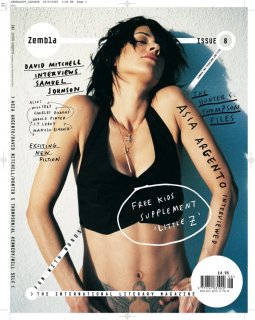 Image-0383BB3ACCBF11D9.jpg95.1 KB · Views: 13
Image-0383BB3ACCBF11D9.jpg95.1 KB · Views: 13 -
 Asia_Argento-56012wallpaper.jpg66.7 KB · Views: 8
Asia_Argento-56012wallpaper.jpg66.7 KB · Views: 8 -
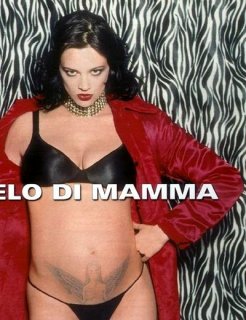 Asia_Argento-56011wallpaper.jpg62.9 KB · Views: 7
Asia_Argento-56011wallpaper.jpg62.9 KB · Views: 7 -
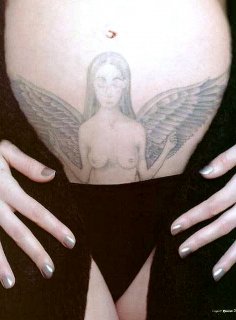 Asia_argento027.jpg61.4 KB · Views: 8
Asia_argento027.jpg61.4 KB · Views: 8 -
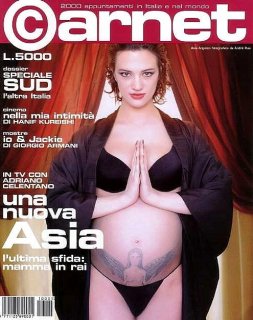 Asia_argento026.jpg98.6 KB · Views: 7
Asia_argento026.jpg98.6 KB · Views: 7 -
 Image-9AAE09D2382111DA.jpg96.8 KB · Views: 37
Image-9AAE09D2382111DA.jpg96.8 KB · Views: 37 -
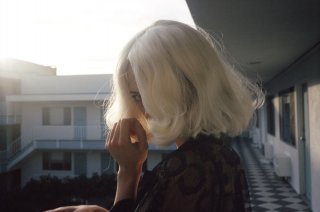 Image-038335DCCCBF11D9.jpg97.8 KB · Views: 18
Image-038335DCCCBF11D9.jpg97.8 KB · Views: 18 -
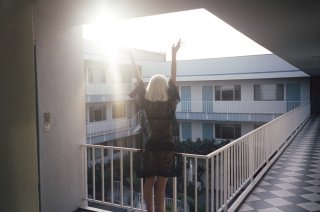 Image-038326B4CCBF11D9.jpg94.6 KB · Views: 20
Image-038326B4CCBF11D9.jpg94.6 KB · Views: 20 -
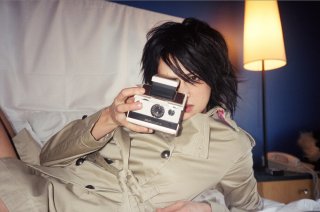 asia_detective.jpg318.9 KB · Views: 20
asia_detective.jpg318.9 KB · Views: 20
WheresMyUmbrella
Active Member
- Joined
- May 20, 2005
- Messages
- 1,799
- Reaction score
- 2
I love that photo of her in the deconstructed dress, looking back over her shoulder. 

Similar Threads
Users who are viewing this thread
Total: 1 (members: 0, guests: 1)
New Posts
-
Donna Karen S/S 2026 : Adriana Lima, Joan Smalls & Grace Elizabeth by Luigi & Iango (15 Viewers)
- Latest: mikel
-
-
-

















